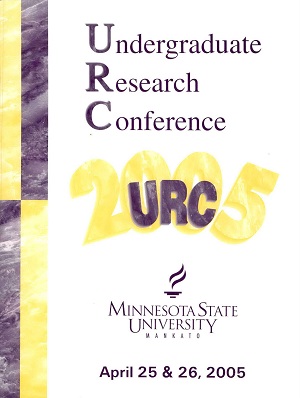Differences in Dissonance Reduction Tendencies Between Low-Context and High-Context Cultures
Location
CSU 201
Start Date
25-4-2005 8:30 AM
End Date
25-4-2005 10:00 AM
Student's Major
Psychology
Student's College
Social and Behavioral Sciences
Mentor's Name
Kevin Filter
Mentor's Department
Psychology
Mentor's College
Social and Behavioral Sciences
Description
This study tested the differences in dissonance reduction tendencies between low-context (American) and high-context (Asian) cultures. There currently have been many studies on the causes of cognitive dissonance and dissonance reduction tendencies. The tendency to justify or rationalize decisions is a part of human nature, but arises in culture-specific manners because specific cultures shape how and when rationalization occurs. The results of this study will be discussed in terms of the effects of personality feedback and interpersonal relationships on dissonance reduction tendencies. This study expects to find that when given negative personality feedback the Americans will have re-rated the posters more often, showing a greater need to justify their decisions. It is also anticipated that the personality feedback will have had no effect on dissonance reduction for the Asians because the situations did not threaten aspects of the interdependent self. When rating the posters for a friend the Asians will likely have re-rated the posters more often, showing a greater need to justify their decisions when choosing for others. The poster ratings for a friend or for self will likely have had no effect on dissonance reduction for Americans because the situations did not threaten the self-concept.
Differences in Dissonance Reduction Tendencies Between Low-Context and High-Context Cultures
CSU 201
This study tested the differences in dissonance reduction tendencies between low-context (American) and high-context (Asian) cultures. There currently have been many studies on the causes of cognitive dissonance and dissonance reduction tendencies. The tendency to justify or rationalize decisions is a part of human nature, but arises in culture-specific manners because specific cultures shape how and when rationalization occurs. The results of this study will be discussed in terms of the effects of personality feedback and interpersonal relationships on dissonance reduction tendencies. This study expects to find that when given negative personality feedback the Americans will have re-rated the posters more often, showing a greater need to justify their decisions. It is also anticipated that the personality feedback will have had no effect on dissonance reduction for the Asians because the situations did not threaten aspects of the interdependent self. When rating the posters for a friend the Asians will likely have re-rated the posters more often, showing a greater need to justify their decisions when choosing for others. The poster ratings for a friend or for self will likely have had no effect on dissonance reduction for Americans because the situations did not threaten the self-concept.
Recommended Citation
Rye, Jennifer. "Differences in Dissonance Reduction Tendencies Between Low-Context and High-Context Cultures." Undergraduate Research Symposium, Mankato, MN, April 25, 2005.
https://cornerstone.lib.mnsu.edu/urs/2005/oral-session-A/6




